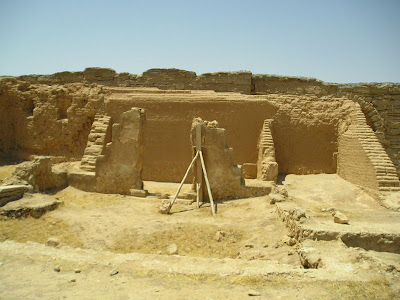
Comparing Calvinism with Reality and Scripture
"I make known the end from the beginning, from ancient times, what is still to come. I say: My purpose will stand, and I will do all that I please."
-Isaiah 46:10
In a universe of created beings with freewill, God knows the details of history and fulfills his purpose. God does not need to override freewill because in his power and wisdom he will do all that he pleases. Since God knows the end from the beginning, his eternal council had already decided all his counter moves before time began. The God of scripture has more wisdom, power, patience and love than the divine tyrant of Calvinism.
Basic Calvinism (Reformed Predestination)
The five major tenets of Calvinism are easily remembered with the acronym TULIP.
T = Total Depravity
U = Unconditional Election
L = Limited Atonement
I = Irresistible Grace
P = Perseverance of the Saints
Total Depravity means that humans are incapable of doing anything good concerning their own salvation. Calvinism teaches that because of this totally fallen state we can not even respond to God's offer of salvation. Thus, in Calvinism, God must give man faith before man can accept God's grace.
Unconditional Election means that there are no reasons (or, conditions) why certain men have been chosen (elected) by God to be saved. The men who are saved where elected by God based only on God's will. This also means God did not look into the future and chose to save those he knew would except his offer of salvation. Some people are elected for salvation, others are not.
Limited Atonement means that Jesus died on the cross only for the sins of those he unconditionally elected (or, those he chose for no reason). Jesus' death was enough to pay for everyone's sins, he just bore the sins of those he had chosen.
Irresistible Grace means that when God calls the elect men that he died for they can not resist. If you are elect, then Jesus paid for your sins, God will give you the faith and you will respond to his call. If God calls you, you will come. If he hasn't elected you, he didn't pay for your sins and he won't call you, because you can't be saved. Everyone hears the call of the gospel with their natural ears, but only the elect hear the inward call of God and respond.
Perseverance of the Saints means, obviously, you can't lose your salvation since God elected you, called you, gave you the faith and made you accept his grace. The Father elected you, the Son died for your sins, the Spirit has applied salvation and you are eternally secure.
Scriptural Balance and Refutation of TULIP
T= Total Depravity: Balance and Refutation by Scripture
Scripture shows that total depravity does not mean men do not have a free will or that they do not have the ability to respond to God, or that they can not hear God, or understand God. Total depravity means that men can do nothing to save themselves and their whole nature (spiritual, physical, mental, emotional, will, etc) is corrupted (not destroyed) by sin.
1. Fallen men have free will
2. Fallen men can respond to God
3. Fallen men can hear God
Genesis 3:10, After Adam fell he could still hear God, "I heard you in the garden and I was afraid . . . so I hid."
Genesis 4:6, God spoke to Cain, "Why are you angry? Why is your face downcast?" and Cain heard and responded to God when God spoke, "Am I my brother's keeper?" (4:9)
4. Fallen men can understand God
Romans 1:18-19 - ". . . the godlessness and wickedness of men who suppress the truth by their wickedness, since what may be known about God is plain to them
Romans 1:18-19 - ". . . being understood from what has been made, so that men are without excuse. For although they knew God, they neither glorified him as God, nor gave thanks to him (1:20,21) . . since they did not think it worthwhile to retain the knowledge of God, he gave them over to depraved mind." (1:28)
U= Unconditional Election: Balance and Refutation by Scripture
The error of unconditional election goes in two directions. One, it claims that some people are elected by God, others are not based only on God's choice. Two, this election is not based on anything man can do, including man's willing acceptance of salvation. Unconditional election means God did not respond to man's faith in time or in eternity past through foreknowledge, but instead God chose some people for salvation and rejected others before time began.
1. The Bible makes it clear that faith is a necessary condition for receiving salvation:
Ephesians 1:13, "You also were included in Christ when you heard the word of truth, the gospel of your salvation. Having believed, you were marked in him with a seal, the promised Holy Spirit."
Romans 5:1, "Therefore, since we have been justified through faith, we have peace with God through our Lord Jesus Christ."
Acts 16:3, "Believe in the Lord Jesus, and you will be saved."
Romans 3:30, "There is only one God, who will justify the circumcised by faith and the uncircumcised through that same faith."
2. Faith is not a work. Belief in the truth is non-meritorious. Faith is a response of the will. Faith with the heart is no more a work than seeing with the eyes is a work.
John 3:14, "Just as Moses lifted up the snake in the desert, so the Son of Man must be lifted up, that everyone who believes in him may have eternal life." (Israelites were healed by "looking" at Moses' snake, just like anyone who "believes" in the Son of God will be saved. No effort, just results.)
Romans 4:5, "To the man who does not work but trusts God who justifies the wicked, his faith is credited as righteousness."
Romans 3:27, "Where, then, is boasting? It is excluded. On what principle? On that of observing the law? no. but on that of faith. For we maintain that a man is justified by faith apart from observing the law."
3. Election, choosing, predestination is based on God's foreknowledge of our free will response to the offer of salvation and the ministry of the Holy Spirit:
Romans 8:29, "For those God foreknew he also predestined to be conformed to the likeness of his Son."
1 Peter 1:2, ". . . who have been chosen according to the foreknowledge of God the Father"
4. Notice the full process of salvation from eternity past to the application of the blood of Christ in time. First Peter 1:2:
Eternity Past:
" . . . who have been chosen according to the foreknowledge of God the Father. . . "
Testimony of the Holy Spirit in time offering salvation:
". . . through the sanctifying work of the Spirit . . . "
The response of faith ("obedience of faith" Romans 1:5):
" . . . for obedience to Jesus Christ . . ."
Receiving of Salvation by the individual believer:
" . . . and sprinkling by his blood."
L= Limited Atonement: Balance and Refutation by Scripture
God loves all people, not only the elect. Jesus died to save all people, not only the elect.
1. God loves all people
Romans 2:11, "For God does not show favoritism."
Matthew 5:45, "He causes his sun to rise on the evil and the good, and sends rain on the righteous and the unrighteous." (Would it not be ironic if God would give everyone sunlight and rain, but only a few the offer of eternal life?)
2. God calls all people
Matthew 22:14, "For many are invited, but few are chosen." (Read the parable before this which basically means the Jews were invited but few accepted the invitation, so additional invitations were sent out to the Gentiles. Refusing the invitation in this parable results in that person not being chosen.)
3. God is love and love does not force its will, but instead is patient, kind. Love is not rude, it is not self-seeking. (1 Corinthians 13:4-7)
2 Peter 3:9, "The Lord is not slow in keeping his promise, as some understand slowness. He is patient with you, not wanting anyone to perish, but everyone to come to repentance."
4. Jesus died for all people in all the world through out all time.
Matthew 23:37, "O Jerusalem, Jerusalem, . . . how often I have longed to gather your children together, as a hen gathers her chicks under her wings but you were not willing."
John 1:29, "Look, the lamb of God, who takes away the sin of the world!"
John 3:16, "For God so loved the world that he gave his one and only Son, that whoever believes in him shall not perish but have eternal life."
Romans 5:6, "You see, at just the right time, when we were still powerless, Christ died for the ungodly. Very rarely will anyone die for a righteous man, . . . But God demonstrates his own love for us in this: While we were still sinners, Christ died for us." (Matthew 5:46-48, "If you love those who love you, what reward will you get? Are not even the tax collectors doing that? And if you greet only your brothers, what are you doing more than others? Do not even pagans do that? Be perfect, therefore, as your heavenly Father is perfect." - I would assume this means the perfect God would die for every one's sins, not just the elect. Jesus would go to the cross for those he knows will never be his brothers.)
1 John 2:2, "He is the atoning sacrifice for our sins, and not only for ours but also for the sins of the whole world."
2 Corinthians5:14-19, "For Christ's love compels us, because we are convinced that one died for all, and therefore all died. And he died for all, that those who live should no longer live for themselves but for him who died for them and was raised again. . . All this is from God, who reconciled us to himself through Christ and gave us the ministry of reconciliation: that God was reconciling the world to himself in Christ, not counting men's sins against them."
1 Timothy 2:3, 4, "This is good, and pleases God our Savior, who wants all men to be saved and to come to a knowledge of the truth."
1 Timothy 2:6, "The man Christ Jesus, who gave himself as a ransom for all men."
Hebrews 2:9, "He suffered death, so that by the grace of God he might taste death for everyone."
2 Peter 2:1,"They will secretly introduce destructive heresies, even denying the sovereign Lord who bought them."
I= Irresistible Grace: Balance and Refutation by Scripture
Scripture shows that God's grace, or calling, or drawing, to salvation is not irresistible.
1. Scripture shows that mankind has the free will to reject God's grace.
Matthew 23:37, "O Jerusalem, Jerusalem, . . . how often I have longed to gather your children together, as a hen gathers her chicks under her wings but you were not willing."
John 3:19, "This is the verdict: Light has come into the world, but men loved darkness instead of light because their deeds were evil. Everyone who does evil hates the light, and will not come into the light."
John 5:39, 40: " These are the Scriptures that testify about me, yet you refuse to come to me to have life."
John 8:24, "I told you that you would die in your sins; if you do not believe that I am you will indeed die in your sins."
John 12:37, "Even after Jesus had done all these miraculous signs in their presence, they still would not believe in him."
Acts 13:46, "Since you reject it and do not consider yourselves worthy of eternal life, we not turn to the Gentiles."
Acts 14:2, " But the Jews who refused to believe stirred up the Gentiles and poisoned their minds against the brothers."
2. Scripture shows that mankind has the free will to accept God's grace:
John 1:12, 13: "Yet to all who received him, to those who believed in his name, he gave the right to become children of God - children born not of natural descent, nor of human decision or a husband's will, but born of God."
John 3:16, "For God so loved the world that he gave his one and only Son, that whoever believes in him shall not perish but have eternal life."
John 6:37, "Whoever comes to me I will never drive away."
John 6:40, "For my Father's will is that everyone who looks to the Son and believes in him shall have eternal live."
John 6:47, "I tell you the truth, he who believes has everlasting life."
John 12:42, "Yet at the same time many even among the leaders believed in him."
Revelation 22:17, "The Spirit and the bride say, 'Come!' And let him who hears say, 'Come!' Whoever is thirsty, let him come; and whoever wishes, let him take the free gift of the water of life."
P= Perseverance of the Saints: Balance and Refutation by Scripture
This refers to once saved, always saved. The main problem with Calvinism is the issue of man's free will in response to God's offer of salvation. Once salvation has been secured there is no reversing the process. Salvation is eternal. The believer has been given everlasting life. At this point of TULIP, the scriptures and logic agree with "P".
2 Corinthians 5:17, "If anyone is in Christ, he is a new creation; the old has gone, the new has come."
Ephesians 1:13, 14, " . . . the promised Holy Spirit, who is a deposit guaranteeing our inheritance until the redemption of those who are God's possession."
Scripture supports a form of "T" (total depravity; corruption of the will, not destruction) and scripture absolutely teaches "P" (Perseverance), but "U" (unconditional election), "L" (limited atonement) and "I" (irresistible grace) require a manipulation of scripture that distorts the clear reading of the text and the consistent witness found through out scripture.
Galyn Wiemers
http://www.generationword.com










